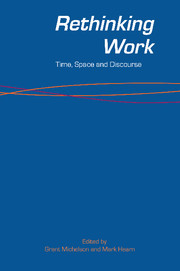Book contents
- Frontmatter
- Contents
- Tables and Figure
- Contributors
- Editorial Statement
- Abbreviations
- 1 Going to a New Place
- PART I TIME
- PART II SPACE
- PART III DISCOURSE
- 11 The National Narrative of Work
- 12 Shareholder Value and Corporate Social Responsibility in Work Organisations
- 13 Rethinking HRM
- 14 Identifying the Subject
- 15 Constructing Older Workers
- COMMENTARY
- Index
11 - The National Narrative of Work
Published online by Cambridge University Press: 05 June 2012
- Frontmatter
- Contents
- Tables and Figure
- Contributors
- Editorial Statement
- Abbreviations
- 1 Going to a New Place
- PART I TIME
- PART II SPACE
- PART III DISCOURSE
- 11 The National Narrative of Work
- 12 Shareholder Value and Corporate Social Responsibility in Work Organisations
- 13 Rethinking HRM
- 14 Identifying the Subject
- 15 Constructing Older Workers
- COMMENTARY
- Index
Summary
How should the Australian Labor Party, reeling from an unexpectedly decisive defeat in the October 2004 federal elections, rebuild credible economic and workplace relations policies? For the nation's leading business daily, the Australian Financial Review, it was a question of language. In November 2004 the AFR editorialised that Labor's ‘institutional links’ with the trade union movement and the union ‘veto’ over party policy left Labor lagging behind the re-elected Howard Government's successful advocacy of an ‘entrepreneurial culture’. Labor was out of touch with a new constituency of workers – a growing, independent and self-reliant army of contractors, consultants, franchisees and small business people. To appeal to this new constituency, Labor's revised economic policies must ‘encourage flexibility, enterprise and upward mobility … Labor's leaders risk being trapped in a rhetorical costume drama with a shrinking audience if they can't shrug off the party's historical baggage and speak the language of 21st century workers and entrepreneurs’ (AFR 3 November 2004).
How has the language of ‘21st century workers and entrepreneurs’ evolved from previous forms of work and managerial language across the 20th century? This chapter explores the close relationship between nation-building and workplace relations that has developed since the Federation of the Australian colonies in 1901. The national narrative of work was expressed and rehearsed in diverse forums and media, in speeches, reports and tracts.
- Type
- Chapter
- Information
- Rethinking WorkTime, Space and Discourse, pp. 215 - 238Publisher: Cambridge University PressPrint publication year: 2006
- 3
- Cited by



